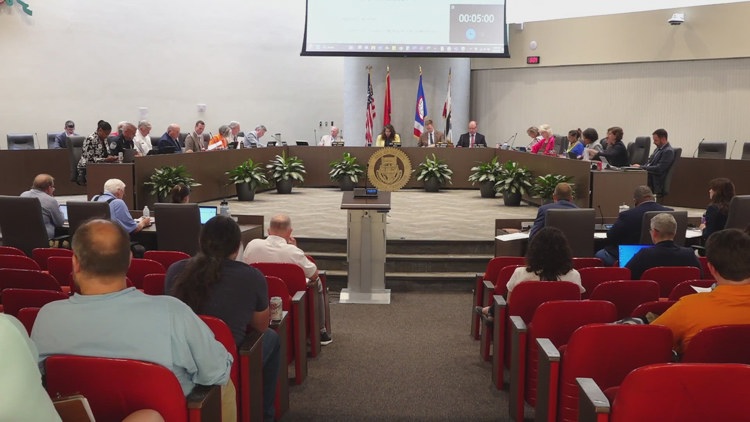KNOXVILLE, Tenn. — City of Knoxville voters are being asked to change the way it elects city council members this November after the state outlawed its previous system.
Knoxville City Charter Amendment 2 asks voters to either vote 'yes' or 'no' on shifting all nine city council seats to 'at large' positions. An 'at large' position is when the entire city votes on the candidates instead of certain districts voting for a candidate.
The Scruffy City has a unique way of electing councilmembers compared to the rest of Tennessee. Right now, there are three at-large city council seats and six district seats. You can see the six districts below:
WBIR spoke with University of Tennessee Political Professor Dr. Bill Lyons ahead of the election to help better explain what a 'yes' vote for City Charter Amendment 2 means. Lyons explained that the wording on the back of your ballot in regard to the amendment can be confusing, so be sure to educate yourself before going to the polls.
What a 'yes' vote means
"Then we’ll have all nine folks elected at large, but six of those are required to live in the district that they represent," Lyons said. "So even though all people will vote for them, they will represent a district that they reside in.”
If the referendum passes, this means councilmembers will live in their district, but seek votes from all over the city, he explained.
"It doesn’t matter if they get more votes in their district or not, it’s who wins in the whole city," he added.
Proponents of the change think it will make councilmembers responsible
"To voters all over the city, even if they live in a district and represent a district," Lyons said. "Those who vote yes think that's okay because they want everybody to have a voice (on all councilmembers)."
But this system wouldn't require candidates to receive votes from their district.
“One way to look at it is if I want to represent a district, say district four, that the only requirement is that I live there," he said. "There’s not a requirement that I get a majority of votes there. There’s not a requirement that I get any votes there.”
A vote yes means: All nine city council seats would be voted upon by the entire city. Six of those nine seats would require the council members to reside in the district that they represent, but all Knoxville residents, no matter where they live, will be able to vote on all nine seats.
What a 'no' vote means
“If folks vote no, then district votes will purely be district votes," Lyons said. "[Councilmembers] will live in the district, voters in that district will choose them, and they will not be subjected to a citywide vote following that.”
This could narrow down the issues councilmembers need to know and care about in their communities, he said.
"They would be expected to probably have more detailed knowledge of, or be a little hypersensitive to, the issues that affected just that area," he said.
Those who vote no, "Would be concerned that a vote citywide might underrepresent what people in that district think... By just requiring [a councilmember] to live in the district."
A vote no means: Three of the city council seats would remain at large (as they were in the previous system). The remaining six seats would be purely district seats. The council member would have to reside in that district to represent it, and only residents from each respective district could vote for those candidates. There would only be one election unless none of the candidates received 50% of the vote. In that case, there would be a runoff.
Why does Knoxville have to change its elections?
Decades ago state lawmakers passed an exception for Knoxville and cities of a similar size to allow voters to elect all of its city council members across all districts on a citywide basis.
HB 0817 removed that exemption. The bill was introduced by Representative Elaine Davis (R - Knoxville) in January 2023 and in effect, it only impacts Knoxville and Morristown because these are the only two cities that utilize the exemption. Sen. Richard Briggs (R-Knoxville) sponsored the Senate counterpart bill. It went into effect on Jan. 1.
Davis does not live in Knoxville but said she felt district nominees could be overruled by voters who live outside the district if the law didn't pass. A statement she released previously is below.
“Our communities deserve to be able to choose which elected officials they want to represent them. Unfortunately, there are places that allow a district’s nominee to be overruled by voters who live outside of the district. This is simply unacceptable and the reason why I was proud to sponsor House Bill 817 to stop this disenfranchisement from continuing. I remain committed to ensuring that Tennessee has the most fair and secure elections in the nation.”



